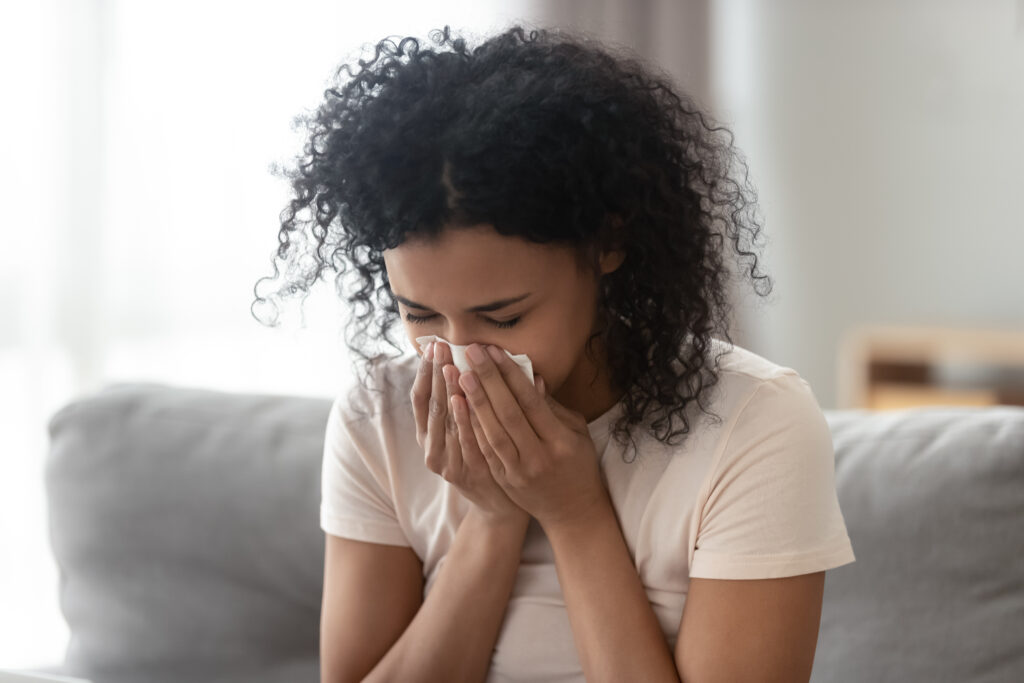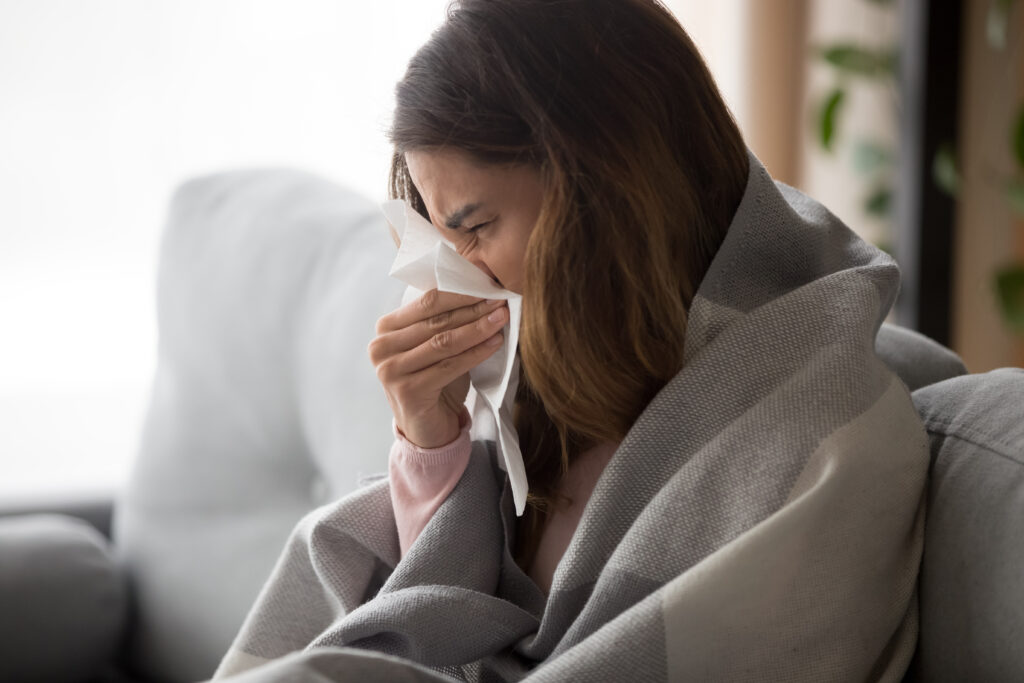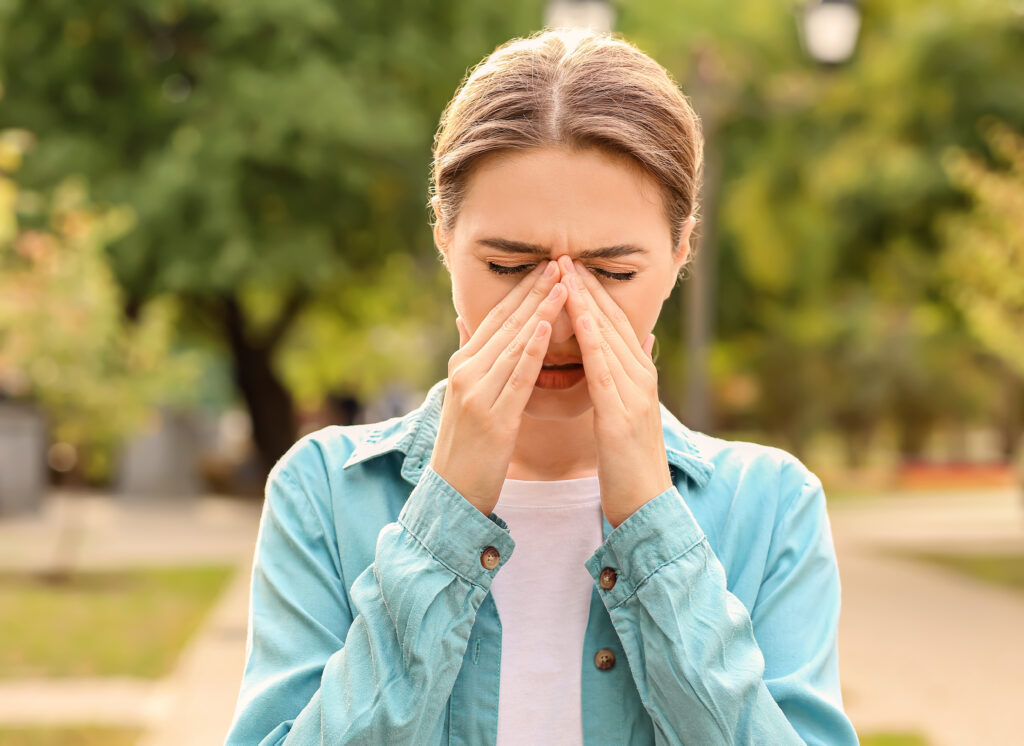March 9, 2023
Can Allergies Cause a Fever?
It’s not always easy to tell if you’re coming down with a cold or a case of hay fever from seasonal allergies. The sneezing, runny nose, headaches, and fatigue feel similar because, in both cases, your body is fighting off an unwelcome intruder. Your immune system fights a viral or bacterial infection if you’re sick. If you have allergies, your body is fighting an allergen.
Learn more about the difference between a cold and allergies and whether allergies can give you a fever.
What Are Allergies?
Allergies are physical reactions to foreign substances that are otherwise harmless. Allergens like certain foods, drugs, pollen, and animal dander don’t cause illnesses or injuries. Still, for people who are allergic, they can lead to symptoms that range from uncomfortable to life-threatening.1
Allergy-triggering substances, known as allergens, get into your body when you ingest, inhale, or come into skin contact with them. When your body detects the substance, it creates a chemical reaction that causes allergic symptoms.
Allergic reactions are an immune response to the proteins in allergens. The first time you come in contact with an allergen, your body creates immunoglobulin E (IgE) antibodies to the allergen. These antibodies bind to cells called mast cells in your skin and mucus membranes.
Whenever your body detects the allergen, the IgE antibodies direct the protein to those mast cells to isolate them. The mast cells release a chemical called histamine to combat the allergens. Histamine leads to inflammation, itching, and mucus production associated with allergic reactions.
Severe Allergic Reactions
Most allergies are not severe and cause mild to moderate symptoms. In rare cases, people have severe allergies to foods, medications, or insect stings that lead to anaphylaxis. Anaphylaxis is a life-threatening medical emergency that requires immediate care. If you think you or someone else is experiencing anaphylaxis, call 911 for assistance.
Symptoms of anaphylaxis include:2
- Swelling of the face, mouth, and throat
- Shortness of breath
- Hives or rash
- Difficulty swallowing
- Chest tightness
- Wheezing
- Abdominal pain or cramps
- Diarrhea
- Vomiting
Anaphylaxis can progress and cause low blood pressure, increased heart rate, loss of consciousness, and death.
Pollen and other environmental allergens don’t typically cause anaphylaxis.
Common Seasonal Allergy Symptoms
Environmental allergens like pollen, dust, and dander are common triggers for allergic reactions. Pollens are the culprit in seasonal allergies that crop up at certain times of the year and lead to cold-like symptoms. This is called allergic rhinitis or hay fever. Common allergy symptoms include:3
- Runny nose
- Nasal congestion
- Itchy nose
- Dark circles under the eyes
- Fatigue
- Disrupted sleep
- Headaches
- Sneezing
- Itchy eyes
- Watery eyes
You may also notice increased asthma symptoms or shortness of breath if you have hay fever. Nasal congestion and post-nasal drip can lead to coughing and a sore throat.
Can Allergies Give You a Fever?
A common question among allergy sufferers is, “Can you get a fever from allergies?” The answer is no! Despite the name “hay fever,” seasonal allergies do not cause a fever. A fever is a temporary rise in body temperature, usually caused by your body’s response to an infection. When you have an infection of any kind, your body has to mount a serious defense to fight off the virus or bacteria. The increased immune activity can raise your body temperature.4
 Certain illnesses, particularly respiratory infections, cause some of the same symptoms as hay fever. Colds, sinus infections, bronchitis, and other illnesses may lead to a stuffy nose, coughing, fatigue, and headaches. When those symptoms are accompanied by fever, you likely have a virus or other respiratory infection. Most illnesses improve with rest, plenty of fluids, and over-the-counter medicines to relieve symptoms.
Certain illnesses, particularly respiratory infections, cause some of the same symptoms as hay fever. Colds, sinus infections, bronchitis, and other illnesses may lead to a stuffy nose, coughing, fatigue, and headaches. When those symptoms are accompanied by fever, you likely have a virus or other respiratory infection. Most illnesses improve with rest, plenty of fluids, and over-the-counter medicines to relieve symptoms.
If you have a fever of 103 degrees Fahrenheit, contact your doctor immediately. You should also contact your doctor if your fever and other symptoms worsen within a few days. You may have a more severe illness that needs treatment.
Common Allergies in the North Texas Area
Since many allergens come from plants, allergies vary by region. People in North Texas may be affected by the trees, grasses, and weeds that grow in the area. Different allergens are prevalent at other times of the year. Spring allergies are generally caused by tree pollen, summer allergies are caused by grass pollen, and fall allergies are caused by weed pollen.
Common allergens around Dallas-Fort Worth include:5
- Juniper/cedar trees
- Ash trees
- Elm trees
- Cottonwood trees
- Mulberry trees
- Oak trees
- Bermuda grass
- Kentucky bluegrass
- Meadow fescue grass
- Timothy grass
- Ragweed
- Platina
- Sagebrush
Treating Hay Fever Allergies
Many people with seasonal allergies that cause hay fever can manage them without seeing a doctor. Over-the-counter allergy medications, such as antihistamines, can be very effective. Popular over-the-counter allergy medicines include:
- Cetirizine (Zyrtec®)
- Fexofenadine (Allegra®)
- Levocetirizine (Xyzal®)
- Loratadine (Claritin®)
You can also try over-the-counter corticosteroid nasal sprays such as Flonase®, Nasacort®, and Rhinocort®.
You can also try limiting your exposure to pollen to reduce hay fever symptoms. Some strategies for avoiding allergy triggers include:
- Staying indoors

- Keeping windows closed in your home and car
- Showering and changing clothes after being outdoors
- Washing your hands frequently
- Avoiding touching your face
- Vacuuming frequently
- Using indoor air purifiers
When to See a Doctor for Hay Fever Symptoms
However, if your allergy symptoms are severe, they may get in the way of work or other activities you enjoy. If you find allergies affecting your quality of life, talk to your doctor. They can refer you to an allergy specialist for testing and treatment.
An allergist can conduct tests to determine exactly what triggers your hay fever symptoms. They will administer a skin prick test, applying a small amount of allergen to your skin and observing the reaction. They may also do blood tests to look for immunoglobulin E.
Your allergist may recommend immunotherapy, also known as allergy shots. You’ll get a series of shots containing small amounts of allergens. Over time, your body will get used to the allergens and stop reacting when encountering them.
If you have questions about allergy symptoms or are unsure if you are experiencing allergies or illness, talk to your doctor. They can answer your questions and help you get the proper treatment.
References:
- “Allergies.” Cleveland Clinic. December 21, 2022. https://my.clevelandclinic.org/health/diseases/8610-allergies
- “Anaphylaxis.” Cleveland Clinic. January 13, 2021. https://my.clevelandclinic.org/health/diseases/8619-anaphylaxis
- “Hay Fever.” American College of Allergy, Asthma, and Immunology. July 16, 2020. https://acaai.org/allergies/allergic-conditions/hay-fever/
- “Fever.” Mayo Clinic. May 7, 2022. https://www.mayoclinic.org/diseases-conditions/fever/symptoms-causes/syc-20352759
- Allergic Plants in North Texas.” Allergy and Asthma Center of Texas.” https://www.aactmd.com/patient-resources/calendar-of-seasonal-allergens-in-texas/
- “Allergic Rhinitis (Hay Fever).” Cleveland Clinic. July 30, 2020. https://my.clevelandclinic.org/health/diseases/8622-allergic-rhinitis-hay-fever
DISCLAIMER
The information featured in this site is general in nature. The site provides health information designed to complement your personal health management. It does not provide medical advice or health services and is not meant to replace professional advice or imply coverage of specific clinical services or products. The inclusion of links to other web sites does not imply any endorsement of the material on such websites.